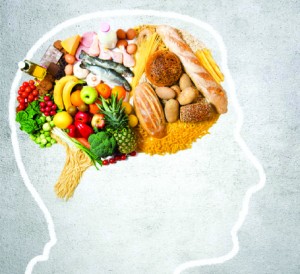By Renee Chillcott, LMHC
 YOU ARE WHAT YOU EAT
YOU ARE WHAT YOU EAT
We’ve all heard this saying before… but what would you say if I told you, “What you eat affects how you feel”? The fuel we give our body is the same fuel we give our brains. So it’s not a surprise that if you eat overly processed foods or too many sugars, you have an increased tendency towards anxiety, depression, attention/focus problems and many more. A child’s brain, for instance, cannot focus on school work or testing if it’s overcome with processing and breaking down food loaded with chemicals.
How do I know if what I eat is affecting my mood?
The National Institute of Health states: the following are health risks of being overweight or obese…
Coronary Heart Disease, High Blood Pressure, Stroke, Type 2 Diabetes, Abnormal Blood Fats, Metabolic Syndrome, Cancer, Osteoarthritis, Sleep Apnea, OHS, Gallstones
And, according to the American Psychological Association obesity can cause:
Depression, Anxiety, Eating disorders, Stress
According to Medscapeobesity/over weight is comorbid with:
Schizophrenia, ADHD, Major Depressive Disorder/Suicide, Abuse/Trauma
I’m not overweight or obese, so I guess that means I’m mentally healthy, and this anxiety can be behaviorally controlled?
Incorrect. How much you weigh DOES NOT indicate how HEALTHY you are and most certainly does not indicate how mentally healthy you are. What is being overlooked is the connection between what we eat, how well we process it in our body and what that means to our brain and mental health.
FAST FOOD MAKES ME CRANKY!
According to Harvard Health Publication”The brain has a direct effect on the stomach. For example, the very thought of eating can release the stomach’s juices before food gets there. This connection goes both ways. A troubled intestine can send signals to the brain, just as a troubled brain can send signals to the gut. Therefore, a person’s stomach or intestinal distress can be the cause or the product of anxiety, stress, or depression. That’s because the brain and the gastrointestinal (GI) system are intimately connected — so intimately that they should be viewed as one system.”
How often do you go to the Psychiatrist or Psychologist with anxiety or depression and they ask you what you are eating? Do they test your nutrition through bloodwork or DNA analysis (Hair Analysis)? Do you have toxic metals in your system contributing to anxiety, depression, or hyperactivity? Do you have slow metabolism causing insomnia? Or do you have inflammation causing depression? Unfortunately, more often than not, our nutritional states are not being evaluated by our physicians or therapists.
What if I eat a fairly healthy diet but still have issues with anxiety or depression?
Malabsorption, slow metabolism, toxic metals, yeast, auto-immune disease, and inflammation are just a few of the conditions we see that exacerbate or cause mental health difficulties. And these can occur from eating healthy foods such as broccoli or kale. Everyone’s body is working at a unique level and what may be beneficial or healthy for one person, can cause stomach upset and anxiety for another. At The Brain and Wellness Center, we offer services in conjunction with Dr. Serena Bordes, ND, DOM ,Lac, that measure the mineral content in your hair. With this information, a world of metabolic events can be interpreted. Not only can your nutritional status be viewed but we can also learn much about how efficiently your body is working. We can detect toxic metals, mineral and element imbalances, metabolism rates and absorption issues, as well as profiles including but not limited to hypoglycemia and candidiasis.
Don’t forget your Brain Training.
Neurofeedback works to regulate your Central Nervous System and the Autonomic Nervous System. These systems control information to hormone centers of the brain like the pituitary gland, as well as balancing the brain and “un-sticking” the “fight or flight” response that controls our CNS and ANS. This not only affects our metabolism and endocrine functioning but also causing emotional problems such as panic attacks and anxiety. Neurofeedback teaches the brain to balance neurons and to self-regulate or become “more flexible” in adjusting to stressful situations. Through this self-regulation, symptoms of anxiety, depression, ADHD, ect. will reduce or be eliminated.
What types of conditions does neurofeedback help?
Symptoms of these conditions, among others,
can improve through neurofeedback training:
- Anxiety, Sleep disorders, Depression,
- ADD/ADHD, Sensory processing disorder,
- Bipolar disorder, Seizure disorders,
- Auditory/visual processing,
- Chronic pain/Fibromyalgia,
- Migraines/headaches, Traumatic brain injuries, Stroke, Cognitive decline, Peak performance, Oppositional defiant disorder,
- Rages/mood swings,
- Attention/focus/concentration,
- Reactive attachment disorder,
- Autism/Asperger’s, Learning disabilities, Obsessive compulsive disorder
HOW DO I GET STARTED?
Getting started with Neurofeedback is fairly simple. Call, text, or email our office to set up an intake session. At the intake session, you will receive a clinical interview, treatment plan recommendations, and a Neurofeedback session (if warranted in your treatment plan). We will also discuss the necessity or timing of nutritional testing. It is not recommended that you stop your medication before coming in and you can continue your therapies. Call to make an appointment today!
Renee Chillcott, LMHC
Renee Chillcott is a Licensed Mental Health Counselor that has been practicing Neurofeedback training since 2005. Renee attended The University of Central Florida where she received her Bachelor of Arts Degree in Psychology in 1995. She then went on to complete her Master’s Degree in Mental Health Counseling with Nova Southeastern University in 2001. She has been a mental counselor in a variety of settings including Outpatient Treatment Agencies, Alternative Education Settings, and Private Practice. Renee received her license in Mental Health Counseling in 2004. Renee decided to enter the field of Neurofeedback because there was very little information made available to people/parents about alternatives to medication. Through the use of Neurofeedback she saw more significant and permanent changes in not only her clients, but also her own family and herself. This inspired her to become the owner/operator of The Wellness Center, located in Boca Raton. At The Wellness Center, adults, teens, children and families enjoy a variety of services from multiple providers. Neurofeedback, Brain Mapping, Acupuncture, Nutritional Counseling, Learning Programs, and counseling are among a few of the services offered.
 South Florida Health and Wellness Magazine Health and Wellness Articles
South Florida Health and Wellness Magazine Health and Wellness Articles




